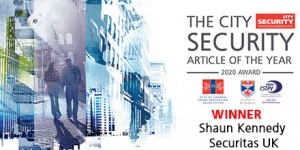Global trends driving security market in 2020
 The development of the security market is driven by global trends. Shaun Kennedy, Country President, Securitas UK explores five key areas which will directly impact how security providers develop their strategy and business plans.
The development of the security market is driven by global trends. Shaun Kennedy, Country President, Securitas UK explores five key areas which will directly impact how security providers develop their strategy and business plans.
A new reality for security
The security needs of clients are evolving, and we are facing a new reality that requires a holistic interconnected approach to security. This involves a combination of people, knowledge and technology to solve today’s industry challenges and those of the future. A good starting place is developing an understanding of key worldwide economic, technological and geo-political developments and events. Five key global trends are explored here.
Societal tension leads to perception of high crime
While conventional crime is on the decline in several mature markets, it declines much more slowly or continues to grow in many developing countries. In either case, the perception of crime remains high. This is partly due to a heightened awareness of threats and crime. It is also due to a rise of geo-political and societal tensions leading to security breaches and more non-conventional crimes, such as terrorism.
The perception that crime rates and threats to society, including terrorism, are increasing drives the demand for security solutions. Authorities are accelerating the outsourcing of some services to the private security industry as they face new and more complex threats, particularly in times of budget restraints.
Security providers are increasingly required to offer support in several areas traditionally handled by the public sector, for example in providing on-site guarding of public areas and at events where physical manpower is required. As this shift in balance progresses, so do the expectations on suppliers: they are evolving to incorporate risk and threat monitoring and analysis, as well as the operational deployment of manpower.
Digital transformation
New and emerging DARQ (Distributed ledger technology, Artificial intelligence,extended Reality and Quantum computing) technologies are comprehensively changing the product mix and offerings available within the industry. The digital transformation is bringing new opportunities, particularly in the area of intelligent services and predictive security, that will continue to have a significant impact on the way security providers support their clients.
Throughout developed markets, end users are continuing to make significant investments in their electronic security infrastructure. This is resulting in the creation of previously inconceivable levels of data; data which is now being harvested in real time to perpetuate the increasing capability of security systems to react faster and predict risk, threats and crime.
Globalisation
Globalisation of the economy has enabled companies to benefit from economies of scale well beyond national borders. Technology is making it possible to connect complex and interoperable security systems from anywhere in the world.
Economic activity and prosperity, especially in developing countries, is driving the underlying demand for security services. There are more assets to protect, and more end users with the resources to buy increasingly affordable security services.
The security provider of the future needs both the technology know-how and the manpower to meet the demands of a global economy. Increasingly, clients will demand a strong local presence, but also expect the high-quality service and solutions of a global security provider.
Urbanisation
In the coming decade, the urban population is expected to grow comparatively faster than the total world population. Cities often have higher rates of both real and perceived crime, and there tends to be more criminal activity in denser populations with growing socio-economic inequalities.
In many emerging economies, urbanisation often entails a growing middle class, which contributes to driving up the demand for private security services. The increased confidence in private security providers to protect people and property also impacts the demand.
Close proximity to clients as well as real-time support, particularly in urban areas, will be a key consideration for security providers of tomorrow.
Sensitive production processes, transport and data centres
Modern production processes are increasingly multinational and sensitive to disruptions. Among other things, they are dependent on well-functioning infrastructure. The increased vulnerability and cost for disruptions is creating a growing demand for innovative and qualitative security solutions and services for manufacturing industries, airports, ports, data centres and public transport.
In-depth security knowledge from client segments such as manufacturing, logistics, public transport and ports will be increasingly important, as will having the expertise to create and deliver complex cross-border security solutions.
Summary
With sensors, analytics and the knowledge of experienced specialists on site, leading security providers can mitigate risks before they become threats, act in real time when needed, and provide clients with added value and peace of mind.
At a global level, security providers are transforming protective services, driving the industry towards holistic intelligent services. The pace of change remains absolute, as does the requirement to provide clients with superior standards of service, coupled with un-paralleled risk mitigation through protective services solutions.
Shaun Kennedy
Country President Securitas UK
See other articles from Securitas here: Securitas company directory

